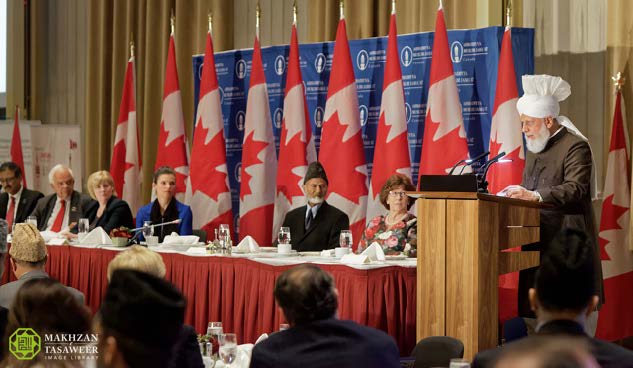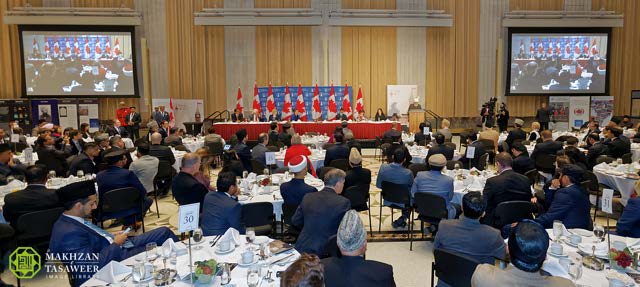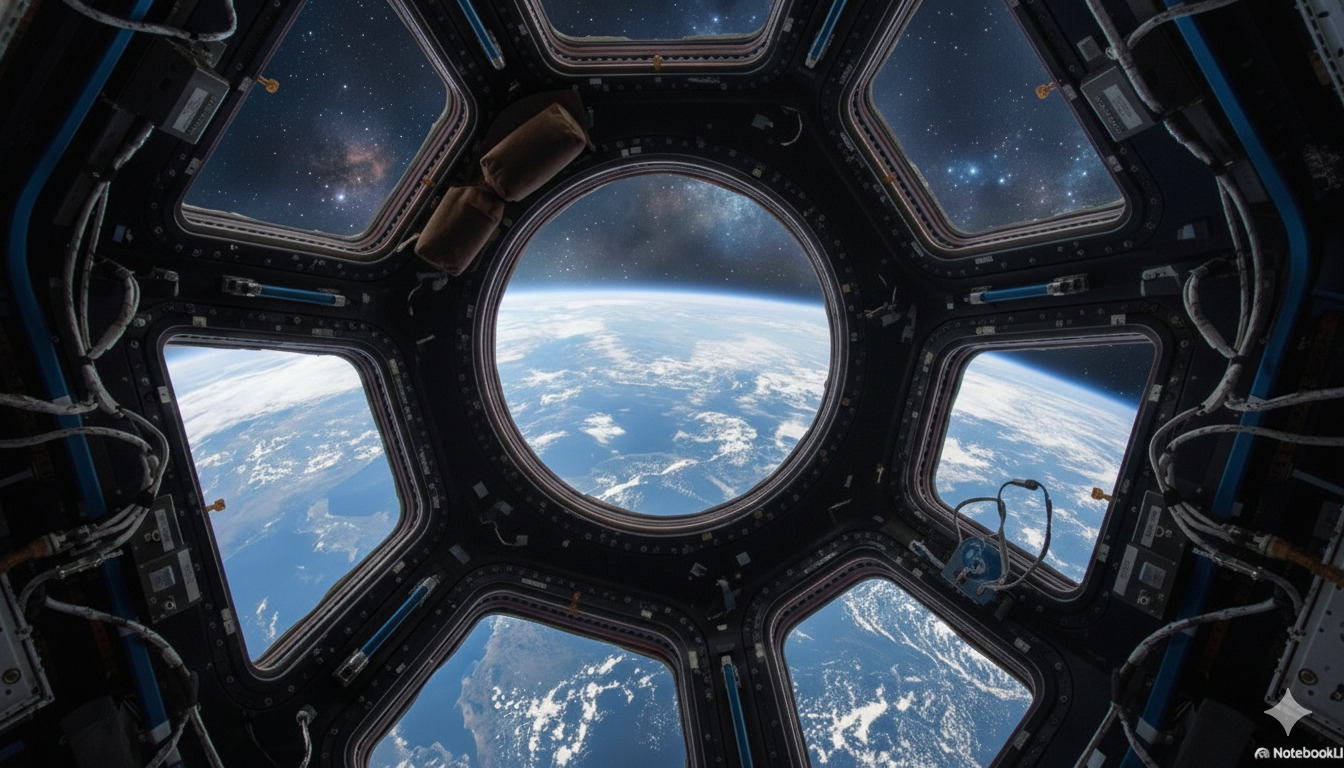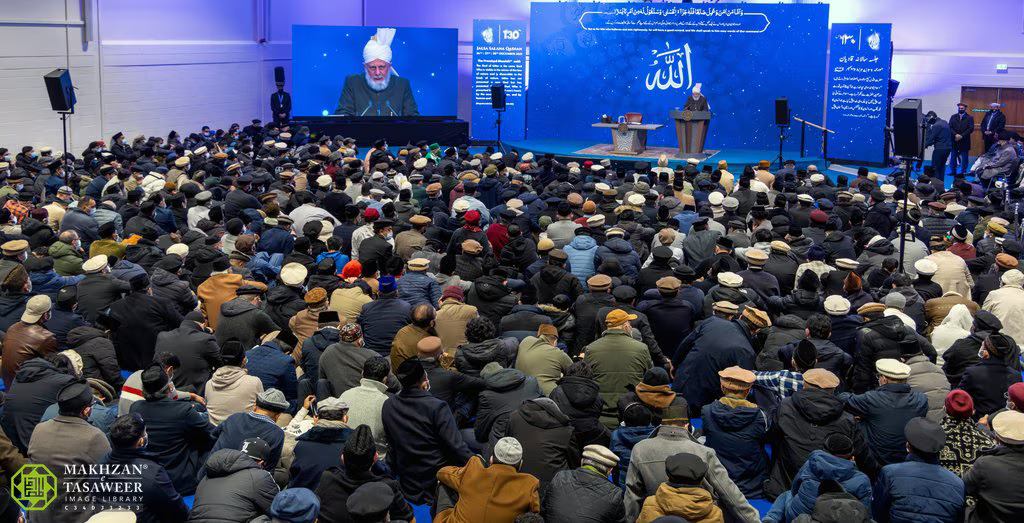World leaders must work towards ensuring that the world we leave behind for our children is marked by peace and prosperity, not a world of crippled economy and malformed children.
APRIL 19, 2020
On 17 October 2016, the Worldwide Head and the Fifth Caliph of the Ahmadiyya Muslim Community delivered a historic address at a special reception at Canada’s National Parliament in Ottawa. His Holiness emphasised the importance of governments ensuring the religious freedom of all their citizens and the need for peace and stability in world affairs. The address was published in The Review of Religions.
In the Name of Allah, the Gracious, the Ever-Merciful.
All distinguished guests, Assalam Alaikum wa Rahmatullahi wa Barakatuhu (peace and blessings of Allah be upon you all).
First of all, I would like to take this opportunity to thank all of you for inviting me, especially our close friend Judy Sgro. I am neither a political person, and nor am I the leader of a political organisation. Rather, I am the Head of the Ahmadiyya Muslim Community, which is a purely religious and spiritual community.
Nonetheless, irrespective of differences of background, I believe that on the basis of humanity, we are all joined together, and should therefore be united. All people and all organisations must collectively endeavour to uphold human values, and strive to make the world in which we live a better and far more harmonious place. Consequently, if human values and human rights are not upheld in one country or region, it has a knock-on effect upon other parts of the world and such wrongdoing can spread further afield.
Conversely, if there is goodness, humanity and prosperity in one part of the world, it will have a positive effect on other societies and other people. As a result of modern forms of communication and transport, we are all now much closer together and are no longer confined or bound by geography. Yet, it is a strange and tragic paradox that even though we are more connected than ever before, we are actually growing more distant by the day. It is extremely regrettable, and a source of grief, that instead of uniting and spreading love amongst mankind, the world has paid far greater heed towards spreading hatred, cruelty and injustice.
People are unwilling to take personal responsibility for their failures and so each individual blames others and considers the division and conflicts of the world to be the fault of everyone else but them. Consequently, we are passing through a time of great uncertainty and no one can truly comprehend what the consequences of our actions will be, both in the short term and in the long term.
In this age, when the fear of Islam is on the increase in much of the world, let me reassure all of you that Islam is not what you commonly see or hear portrayed in the media. As far as my knowledge of Islam is concerned, I only know of that Islam whose teachings are based on its name. The literal meaning of the word ‘Islam’ is peace, love, and harmony and all of its teachings are based upon these noble values. However, unfortunately, it cannot be denied that there are some Muslim groups, whose beliefs and actions are in total contrast to this. In complete violation of Islam’s fundamental teachings, they are perpetrating the most horrific violence and terrorism in its name. In light of all this, I shall now seek to share with you Islam’s true and peaceful teachings.
This esteemed venue, where you have courageously invited me, is not a house of religion and probably there are many amongst you who are not personally interested in religion. However, in your capacities as lawmakers, you will sometimes have to deal with matters that affect the followers of religion. In this context, the Holy Quran categorically states in chapter 2, verse 257, that “there should be no compulsion in religion”.
What a clear, comprehensive and unequivocal statement that enshrines freedom of thought, freedom of religion and freedom of conscience. Thus, my belief and my teaching is that every person, in every village, town, city or country has the undisputed right to choose his or her religion and to practice it.
Furthermore, every individual has the right to peacefully preach and propagate his or her teaching to others. These freedoms ought to be guaranteed as basic human rights, and so legislative assemblies or governments should not unduly involve themselves in such matters, otherwise, there is a risk that their intrusion could be viewed as a source of provocation and lead to frustration and resentment. Sadly, in today’s world, we are seeing how Muslim governments are themselves interfering in such personal matters and this is a root cause of the instability and conflicts in those countries.
The only beneficiaries are extremist religious clerics and militants who are taking advantage of the frustrations of people by promoting barbaric violence and senseless conflict. However, it cannot be said that Western governments, who claim to be truly democratic, are entirely innocent or blameless. Rather, here in the West, we also see that sometimes laws or rules are enacted that are in conflict with Western claims of being beacons of universal religious freedom and tolerance.
Laws are occasionally created that contradict the view that every person in the Western world is free to believe whatever he or she desires and to have the liberty to live peacefully according to his or her faith. It is not wise for governments or parliaments to place restrictions on the basic religious practices or beliefs of people. For example, governments should not concern themselves with what type of clothing a woman chooses to wear. They should not issue decrees stating what a place of worship should look like. If they overreach in this way, it will be a means of restlessness and heightening frustrations amongst their people.

Such grievances will continue to exacerbate if they are not checked and ultimately will threaten the peace of society. Of course, I am not advocating that people with extremist views should be tolerated or free to pursue their beliefs.
Wherever and whenever someone uses his religion to justify cruelty and injustice, or to usurp the rights of others, or to act against the state, or in a way that affects the security of the nation, it is certainly the responsibility of the government and authorities to firmly stop such evil practices. In such circumstances, it is entirely justified and proper for the government, parliamentarians and other relevant authorities to ensure that such people are rooted out and punished in accordance with the law of the land. Nonetheless, in my view what is wrong is for the state to needlessly interfere with peacefully held religious beliefs and practices.
The Islam that we know and practice teaches that the love of your country is an essential part of your faith as a Muslim. According to Islam, a person’s country is the one in which he lives and from which he derives benefit, and when such a teaching is ingrained in a Muslim’s heart and mind, it is impossible for him to think ill or to desire any harm to his country.
Furthermore, Islam teaches that not only should the law of the land punish anyone who acts against his country, but also that such people will surely enter the Court of God Almighty and be held accountable by Him for their misdeeds and disloyalty. Hence there is no need to fear a true Muslim and there is no need for the government to enact laws that infringe upon relatively small religious issues or practices, which neither cause harm or danger to the members of the public or to the state. To legislate on such matters can only be described as an unnecessary interference and an invasion of those freedoms that the West claims to champion – that is the right of each person to live with liberty and personal autonomy. Undoubtedly, such unjust interventions cannot have any positive effect but can only lead to frustration, restlessness, and discord. It is the task of the government and parliamentarians, as guardians of their nations, to legislate in a way that gives rights to their citizens rather than takes their rights away. This should be done across the board, indiscriminately, so that the rights of all people, whether they be Muslims, Christians, Jews, Hindus, or the people of any other belief, including those who are not religious, are upheld and guaranteed at all times.
As I have already said, it is a cause of deep sorrow that in both the Muslim world, and also amongst some developed non-Muslim countries, certain policies have been made that undermine these core freedoms, which have in turn caused grievances amongst segments of the public. Therefore, rather than seeking superficial plaudits, they should look at the bigger picture of how they can bring peace to their nations and ensure that their country and the wider world becomes united and increasingly prosperous. Yet unfortunately, instead of taking a long-term view, it seems that most leaders or governments have joined an unhealthy race for power and a battle to assert their dominance over others.
Consequently, they are increasingly willing to interfere in the personal and religious matters of their citizens due to this thirst for supremacy and control. Such policies are unwise and an unnecessary means of further destabilising the world, especially given that we are already facing so many different problems and issues that threaten the peace of society. For example, it is said that climate change is a huge threat to our civilisation. Another burning issue is the economic uncertainty facing the world. Further, and more generally, there is the issue of an increasing lack of peace and security in much of the world. All of these issues are the result of unjust policies, inequality and a lack of balance. If we take the issue of climate change, we see that a major cause of global warming has been the industrial revolution in the West and the fact that forests and flora were excessively cut down.
Only now that such countries have fully developed are they happy to call for a reduction in carbon emissions or other industrial restrictions. However, such regulation may slow down and curb the advancement and growth of emerging powers such as India and China. And so these rising nations may well view such restrictions as hypocritical, unfair and an attempt by the historically dominant powers to stop them from progressing and from challenging the global order. Thus, the issue of climate change is actually not only an environmental issue, but is also contributing to the world’s lack of peace and increasing resentment between nations.
Similarly, in terms of the global financial crisis, many experts admit that governments have long made unwise policies and that today’s fiscal uncertainty has now reached a level where it threatens the peace of the world. There are also many other factors that are contributing to the world’s lack of peace and regrettably many are linked to self-serving and unjust policies that have been implemented by certain countries. Anyway, the ultimate result of the various risks and global threats is that the world is rapidly moving towards an unthinkable catastrophe. Due to the current instability, both the world’s governments and the members of the public are becoming increasingly anxious and concerned.
There are so many troubling issues that the world no longer knows which to prioritise. Should they focus first on global warming and climate change? Or should they address the financial crisis? Or should they prioritise the fight against terrorism, warfare and extremism? Or should they focus on the latest developments in Syria, where Russia and the United States are openly opposing one another? Or should they give attention to, more recently, the direct conflict between the USA and Yemen?
Personally, it is my view that the most critical and pressing issue facing us is the lack of peace in the world. And it is a cause of huge regret that the Muslim countries are the centre of such instability and disorder, even though their religion has given them unparalleled teachings of how to establish and maintain peace. For example, in chapter 23, verse 9, of the Holy Quran it is stated that a true Muslim is a person who fulfils any covenants or promises with which they have been entrusted. To be handed the keys to government is a huge trust and so we often see heads of state pledge to serve their nations faithfully and with absolute justice. Sadly, in many cases such honourable pledges prove to be hollow words that are not acted upon, whereas if this Quranic teaching was followed, we would never see division or conflict between the public and their governments. Furthermore, in chapter 5, verse 9, the Holy Quran states that even if a person or nation has enmity with another, they should still treat them in an entirely fair and just manner, no matter the circumstances, because that is what Allah the Almighty desires.
Yet today, rather than justice, we witness injustice at every level of society, both between people and nations. Such inequality and disregard for fairness is directly contributing to the world’s lack of security. In chapter 49, verse 9 of the Holy Quran, it states that if two parties or nations are in a state of conflict then their neighbours and allies should seek to bring about reconciliation. If peace cannot be established through dialogue, then the other nations should unite against whosoever is perpetrating injustice and use force to stop them. Once the aggressors adopt peace, they should not be humiliated and nor should unfair sanctions be levied upon them. Rather, in the interests of fairness and long-term peace, they should be permitted to move forward as a free society.
If we assess the current conflicts in the Muslim world, it is clear that this principle of uniting against those who seek to undermine peace has not been observed. If the neighbour countries had sought to mediate impartially and put aside their own interests the situation could have been contained long ago. However, it is not only the fault of the Muslim nations, but other countries living in this global village of ours, have also contributed to the disorder. If the major powers had acted equitably and sincerely at all times we would not have seen such discord and we would not have seen the emergence of Daesh or extremist rebel groups in countries like Syria and Iraq. Regrettably, some major powers have not played their role in establishing peace, and have instead enacted unjust policies in order to serve their own interests.
For example, certain Western countries have always had an interest in the oil reserves of the Arab world and this interest has motivated their policies over a long period of time. Further, they have sold huge stocks of weapons to Muslim countries without considering the potential consequences. What I am saying is nothing new or concealed. Rather, it is well documented. For example, a recent report by Amnesty International published in December 2015 states that, “decades of reckless arms trading” had contributed to the terrorism conducted by Daesh. It stated that the majority of weapons being used by Daesh were originally produced in the United States and Russia.
Furthermore, Patrick Wilcken, a Researcher on Arms Control at Amnesty, concluded the report by stating:
“The vast and varied weaponry being used by ISIS is a textbook case of how reckless arms trading fuels atrocities on a massive scale.”
Certainly, it is well known that Muslim countries do not have sophisticated arms factories that could produce the state-of-the-art weapons used in the Middle East, and so the vast majority of artillery being used in the Muslim world is being imported from abroad. If the major powers ceased to trade arms and ensured that the other supply lines of the warring governments, rebels and terrorists were cut, such conflicts could be brought to a swift conclusion. For example, it is well known that Saudi Arabia is using weapons purchased from the West in its war in Yemen, in which thousands of innocent civilians, including women and children, are being killed and so much destruction is being wrought. What will be the ultimate result of such arms trading?
The people of Yemen, whose lives and futures are being destroyed, will not only bear hatred and seek revenge from Saudi Arabia but will also bear hate towards Saudi’s arms suppliers and the West in general. With no hope or future prospects left, and having witnessed the most horrific brutality, members of their youth will be prone to radicalisation and in this way a new vicious cycle of terrorism and extremism will arise. Are such destructive and devastating consequences worth a few billion dollars? Thus, there is no longer only a risk to the Muslim countries who are at the epicentre of today’s conflicts, rather the threat has spread much further afield, as we have already witnessed with the recent terrorist attacks in Paris, Brussels and the United States.
There have also been lower-level terrorist incidents here in Canada over the past couple of years of which you will all be well aware. Furthermore, despite the fact that Canada lies thousands of miles away from the Arab world, still we find that Muslim youths have travelled from this country to join extremist groups in Syria and Iraq. Of great concern is the fact that, according to the Canadian government’s own statistics, twenty percent of those who have gone to Syria or Iraq have been women and this means they will not only have been radicalised themselves but will also be indoctrinating and brainwashing their children.
In order to tackle radicalisation and extremism, we must also assess what are its causes and symptoms. Regrettably, most radicalised Muslims who are living in the West have no knowledge or a basic understanding of Islam’s teachings. Thus, their radicalisation is a result of their personal frustrations and not due to any ideological convictions or beliefs. Apart from online radicalisation or hate preaching in mosques or the spread of extremist literature, I believe that a major cause of the radicalisation of Muslim youths living in the West has been the economic crisis and many published reports corroborate this. There are many young Muslims who have gained qualifications, but in spite of their education, have not attained suitable employment and so have become marginalised and frustrated.
Due to economic difficulties, they are vulnerable and easy prey for extremist clerics and terrorist recruiters. Hence, if young people are given fair opportunities to better themselves and to enter the workforce it will be a means of keeping one’s country safe and secure. At a global level, if only the major powers and the international institutions, such as the United Nations, had truly acted upon their founding principles, under all circumstances, then we would not have seen the toxic plague of terrorism infect so many parts of the world. We would not have seen the world’s peace and security repeatedly undermined and destroyed. And we certainly would not have witnessed the huge refugee crisis, which now confounds and frightens the people of Europe and other developed countries. Hundreds of thousands of innocent people have fled to Europe, and thousands have also come here to Canada, in order to seek refuge from the terrorists who have poisoned their own nations.
Though most of the refugees will be genuine and decent people, just one or two negative incidents, as we have seen in the past year, are enough to cause panic, as we are starting to see in Europe and also to some extent here in North America as well. Hence, we are seeing with our own eyes, just how uncertain the world is becoming and how hatred and anxiety has consumed and engulfed much of the world. I repeat that the root cause remains injustice and inequality. Ultimately, a lack of fairness is also what precipitated the global financial crash and the growing disparity between the rich and the poor during the past few years. I say this, given that whilst developed and richer nations may have chosen to invest in poorer countries, they have prioritised their own vested interests above facilitating the development of those local countries.
Rather than exploitation and greed, the developed nations ought to have championed the rights of the weaker nations and sought their advancement. They ought to have sincerely helped the people of those poor nations stand upon their own two feet with dignity and honour. Yet, most regrettably, this has simply not happened. In chapter 20, verse 132 of the Holy Quran, it instructs that no one should cast covetous eyes upon the wealth or resources of others. If the entire world acted upon this one principle, then the world’s financial systems would be fair and just.
Capital would be distributed equitably and nations would reap the rewards of their God-given wealth. We would see that the world’s trading would be underpinned by a desire to fulfil the human rights of others, rather than to greedily acquire power and wealth and to fulfil personal interests at all costs. Another example of the world’s injustice is reflected in the world’s politics.
In some countries, there are dictatorships or unjust governments, yet the major powers turn a blind eye to their cruelties, because those governments happen to support them and facilitate the procurement of their interests. Yet, in countries where the leaders or governments do not bend to the whim of the major powers, they are quite happy to support rebel elements or to demand regime change. In truth, there is no difference in the way the respective governments are treating their own people. The material difference is only that in some cases, the governments cooperate with the major powers, whilst in others, they do not.
In terms of the latter category, Western military policies have been devised to remove those governments, as in Iraq and Libya, and similarly such attempts have been made in Syria over the past few years. Time has proved Canada’s decision not to take part in the Iraq War as the right one and I also agree with your government’s decision to halt its airstrikes in Syria until the circumstances of that particular conflict and the means to resolve it become much clearer. At a broader level, the United Nations must also play its role in establishing peace in the world, unencumbered by politics, injustice or favouritism. I hope and pray that Allah the Almighty enables the United Nations and the world’s governments to act in this way so that true and long-lasting peace may be established.
The alternative does not bear thinking about, because if we continue as we are then the world is charging madly towards a huge catastrophe in the shape of another world war. May Allah grant wisdom to the world’s leaders and policymakers so that the world we leave behind for our children and future generations is a world of peace and prosperity and not with a crippled economy and malformed children – Amin.
In the end, I would like to once again thank you for inviting me here today. Thank you very much.













0 Comments